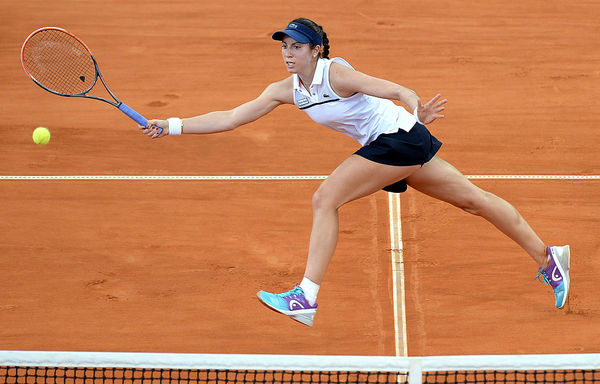ROME, Italy – 2015 Internazionali BNL d’Italia semifinalist Daria Gavrilova edged past former Wimbledon finalist Sabine Lisicki, 6-1, 7-6(3), to set up a second round meeting with Mutua Madrid Open champion Simona Halep in the second round.
Watch highlights, interviews and more video from Rome right here on wtatennis.com!
“It was a tough match,” she said following her win. “I played really well in the first set and then in the second set I had chances to break her in the second game, but then I got broken in the next game. Then I was a break down until 4-2, so it could have gone either way – we were both making a lot of mistakes.
“I’m happy that I could manage my nerves in the tie-break and play a pretty clean tie-break.”
Gavrilova raced through the opening set, but Lisicki, who has only won back-to-back matches once in 2016, was on course to turn things around early into the second by taking a 4-1 lead of her own.
With some help from an on-court coaching session with Nicole Pratt, Gavrilova roared back to serve for the match after winning four games in a row, but Lisicki had one more momentum swing in store, getting to within one game of a decisive set.
Holding serve to force a second set tie-break, the youngster bounded onward and upward to clinch the match in 82 minutes. Though both she and the German each hit 18 winners, Lisicki was ultimately undone by 26 unforced errors to only 17 from Gavrilova.
“I love it [being back in Rome]. I was very surprised we played on the Grandstand; when I saw the schedule, I was like, ‘Woah, this is so cool.’ And you know the fans here are like really into it, so it means a lot to the players.
Up next for the Aussie is No.6 seed Simona Halep, who is coming off of her second career Premier Mandatory title at the Mutua Madrid Open.
“I know I have Halep next because she had a bye. I know that’s going to be a tough match, but I’m really looking forward to it.”
Earlier in the day, No.9 seed Svetlana Kuznetsova eased through her first round match with Caroline Garcia. Though the Frenchwoman has been playing some of her best tennis in doubles with partner Kristina Mladenovic, that success has yet to translate in singles, as Garcia fell, 7-5, 6-2.
“I had a tough one against her in Miami, 7-6 in the third,” Kuznetsova said after the match. “I’m really happy I was able to get it done in two sets today. I don’t think I played my best game, but I feel better playing on clay, for sure.”
Mladenovic also had trouble in her first round with Jelena Ostapenko, as the young Latvian took out the World No.28, 6-3, 6-1.
Mladenovic qualified for the BNP Paribas WTA Finals Singapore presented by SC Global last fall alongside Timea Babos, who is in the midst of a career-best season in singles; the Hungarian powerhouse blasted past qualifier Kiki Bertens, 6-1, 6-4.
Samantha Stosur saved a match point against Alison Riske in their first round before Gavrilova’s countrywoman pulled through, 4-6, 7-6(5), 6-1. Lesia Tsurenko similarly recovered from a set and a break down to defeat qualifier Julia Goerges, 1-6, 7-6(5), 6-3.
No.11 seed Timea Bacsinszky had no problems against Yanina Wickmayer, setting up a second round match with Tsurenko, 6-2, 6-2.





